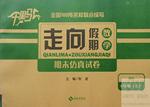题目内容
It is well-known that the Internet will let people have ________ to huge amounts of information from their own homes.
A. entrance B. way C. means D. access
练习册系列答案
 千里马走向假期期末仿真试卷寒假系列答案
千里马走向假期期末仿真试卷寒假系列答案
相关题目
题目内容
It is well-known that the Internet will let people have ________ to huge amounts of information from their own homes.
A. entrance B. way C. means D. access
 千里马走向假期期末仿真试卷寒假系列答案
千里马走向假期期末仿真试卷寒假系列答案